Tuesday, August 01, 2006
The Middle East - What Do YOU Know?
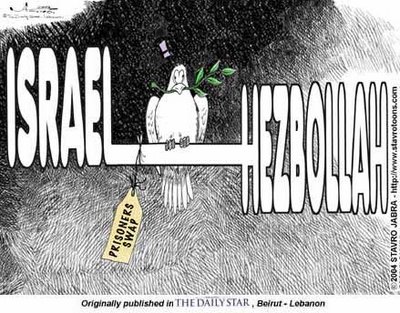
I think this post is more for me than it is for my readers. I suspect, however, that most Americans, in actuality, understand little about what is really going on in The Middle East right now.
This post, then, serves to piece together what I think I understand about the current conflict in The Middle East. Let me be clear - I am no Middle East expert. I am sure that there are individuals who will read this and find loopholes in my placing of events. But it should also be known that I really come to this subject with no strong convictions - save for the ultimate desire to see the conflict in The Middle East cease.
So here goes...
Israel holds between 400 and 600 Lebanese "security prisoners" in their prisons. These prisoners include women and children.
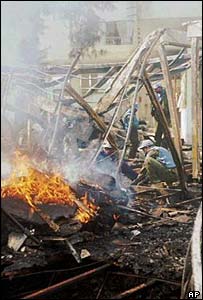 The United States has declared over and over again it's desires for democratic elections to take place throughout the Middle East. The United States government identifies Hezbollah as a terrorist organization. However, similar to the democratically elected Hamas government of Palestine, members of Hezbollah have been democratically elected to the Lebanese government - in 1992, 12 of the 128 seats in the Lebanese parliament were won by Hezbollah candidates. Ten seats were won in 1996, eight seats were won in 2000, and in 2005, fourteen seats were won.
The United States has declared over and over again it's desires for democratic elections to take place throughout the Middle East. The United States government identifies Hezbollah as a terrorist organization. However, similar to the democratically elected Hamas government of Palestine, members of Hezbollah have been democratically elected to the Lebanese government - in 1992, 12 of the 128 seats in the Lebanese parliament were won by Hezbollah candidates. Ten seats were won in 1996, eight seats were won in 2000, and in 2005, fourteen seats were won.
Hezbollah wanted to have Lebanese prisoners released from Israeli prisons, and as such, they captured two Israeli soldiers, with the mistaken hopes of coordinating a prisoner exchange. This practice had been common in the past, and the organization calculated that the same thing would happen.
They were wrong. Rather than negotiating, Israel launched a military response, relentlessly bombing Lebanon until such time as the soldiers were returned to Israel.
Hezbollah responded to Israel's military actions by raining down missiles on Israeli citizens.
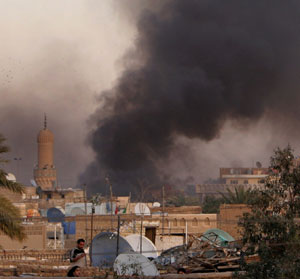 How do you end a conflict when everyone is wrong? When all the moves are miscalculated? When the conflict is emboldened by larger powers on either side?
How do you end a conflict when everyone is wrong? When all the moves are miscalculated? When the conflict is emboldened by larger powers on either side?
Make no mistake about it - Hezbollah is a terrorist organization if for no other reason than they espouse an ideology which includes the destruction of Israel. While they state that they are forbidden to harm anyone who is innocent, they have targeted Israel indiscriminately, making no distinction between Israeli military and its citizens. One would also argue that capturing Israeli soldiers with the intent of coordinating a prisoner exchange is foolish, even if this has taken place in the past.
Israel's response, however, has also been foolish. While they have one of the most intelligent, well-trained military forces in the world, and posses the most precise weapons in the world, they have repeatedly made glaring errors in their military strikes, including an airstrike on a U.N. observer post, killing at least four U.N. observers, as well as the most recent strike on Qana, which resulted in large civilian casualties. Most of these deaths were women and children.
One may argue that Hezbollah has placed themselves within civilian populations, and as such, Israel has no other alternative. Given this knowledge, however, one must question the reasoning that would push Israel to these attacks in the first place.
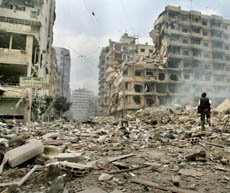 Every time Israel kills a civilian in Lebanon, they leave behind family and friends who are pissed off, and probably become sympathetic to the Hezbollah movement. Hezbollah has always enjoyed support by Lebanese citizens, largely due to its social services - in addition to its military actions, Hezbollah operates schools, clinics and hospitals and provides services to citizens at less expense than the Lebanese government can provide.
Every time Israel kills a civilian in Lebanon, they leave behind family and friends who are pissed off, and probably become sympathetic to the Hezbollah movement. Hezbollah has always enjoyed support by Lebanese citizens, largely due to its social services - in addition to its military actions, Hezbollah operates schools, clinics and hospitals and provides services to citizens at less expense than the Lebanese government can provide.
How ironic is it that Israel's attempt to destroy Hezbollah winds up exacerbating the problem, actually creating sympathy throughout the Arab world for this terrorist organization? There was a thought that Israeli attacks punishing Lebanese citizens for embracing Hezbollah would turn its citizens against Hezbollah and aid in the destruction of the terrorist organization. But the opposite has happened.
Additionally, it should be noted that the destruction of Hezbollah will not end the problems for Israel. One has only to look at the PLO for evidence of that. The PLO in Palestine was ultimately replaced by Hamas. The same thing is destined to happen in Lebanon.
Worldwide views of the United States are not fairing any better in this conflict. While Bush has called on Iran and Syria to stop their support of Hezbollah and to end their encouragement of the violence in the Middle East, the United States continues to ship weapons to Israel, thereby assisting Israel in their military efforts, and encouraging the violence in the Middle East.
America is reliving all of its past wars in the Middle East right now. Iraq has become this generation's Vietnam, with American soldiers caught in the middle of a civil war between Islamic factions, operating essentially as nothing more than targets.
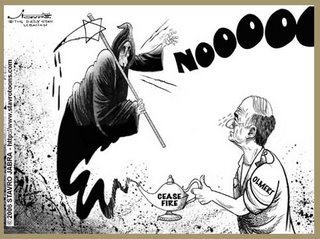 If the comparison between Iraq and Vietnam can be made, perhaps an analogy can be drawn between the Israeli-Hezbollah conflict and the Korean war. The Korean war was a proxy war between the United States and the communist powers of China and the Soviet Union. Today, that same proxy war is taking shape between the United States and countries like Iran and Syria.
If the comparison between Iraq and Vietnam can be made, perhaps an analogy can be drawn between the Israeli-Hezbollah conflict and the Korean war. The Korean war was a proxy war between the United States and the communist powers of China and the Soviet Union. Today, that same proxy war is taking shape between the United States and countries like Iran and Syria.
The losers in this conflict are seemingly endless. Obviously, there are the Israeli and Lebanese citizens who are caught in the crossfire.
Israel loses, as well. How do they get out of this conflict with anything that can be viewed as a win? Even if they completely destroy Hezbollah - wipe them off the face of the map - how does that ultimately ensure their security? It does nothing of the kind, because the cost of their military action is the knowledge that they create millions more enemies in the process, all intent on destroying Israel and delivering revenge and what they perceive to be justice.
The United States loses, largely by failing to take action to end the violence on both sides and resume diplomacy aimed at peace in the Middle East. Moreover, the government shares culpability in the Arab world, because of the blind support of Israel and the continual supply of weapons that we provide to Israel. As we all know, the last thing that America needs right now is yet another reason for those in the Middle East to hate us. Remember that battle we were supposed to be fighting for the hearts and minds? How's that going?
It is sad to think that one of the few winners in this conflict may ultimately be Hezbollah, provided they can survive in any organized capacity. If that happens, they will be able to raise their fists in the air and say that they repelled the "Zionist Aggressor," lending undue credibility to their claim that they are a "resistance organization," rather than terrorists.
So, that's the situation as I see it currently. As I said, I'm sure there are potential flaws in my thinking, and I post this more to try and gain some understanding for myself. I encourage all of you to add to this notion of understanding. Let's try to put this in terms that most Americans can understand, so that we can all be knowledgeable about this issue, rather than simply turning a blind eye to it and dismissing it as not worthy of our attention due to the complexity of the issues surrounding the conflict.
Tell me where I have it right. Point out where you see the flaws. Let's talk about it.
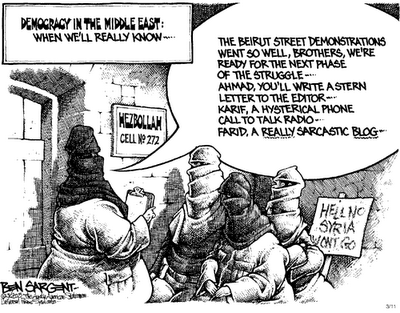
Tags: Middle East, Israel, Lebanon, Palestine, Iran, Iraq, Syria, United States, war, peace, diplomacy, military
Posted by FleshPresser at 11:43 PM /


Grub the Raper posted at 3:19 PM
If only they'd give diplomacy a chance!


« Home



 The United States has declared over and over again it's desires for democratic elections to take place throughout the Middle East. The United States government identifies Hezbollah as a terrorist organization. However, similar to the democratically elected Hamas government of Palestine, members of Hezbollah have been democratically elected to the Lebanese government - in 1992, 12 of the 128 seats in the Lebanese parliament were won by Hezbollah candidates. Ten seats were won in 1996, eight seats were won in 2000, and in 2005, fourteen seats were won.
The United States has declared over and over again it's desires for democratic elections to take place throughout the Middle East. The United States government identifies Hezbollah as a terrorist organization. However, similar to the democratically elected Hamas government of Palestine, members of Hezbollah have been democratically elected to the Lebanese government - in 1992, 12 of the 128 seats in the Lebanese parliament were won by Hezbollah candidates. Ten seats were won in 1996, eight seats were won in 2000, and in 2005, fourteen seats were won. How do you end a conflict when everyone is wrong? When all the moves are miscalculated? When the conflict is emboldened by larger powers on either side?
How do you end a conflict when everyone is wrong? When all the moves are miscalculated? When the conflict is emboldened by larger powers on either side? Every time Israel kills a civilian in Lebanon, they leave behind family and friends who are pissed off, and probably become sympathetic to the Hezbollah movement. Hezbollah has always enjoyed support by Lebanese citizens, largely due to its social services - in addition to its military actions, Hezbollah operates schools, clinics and hospitals and provides services to citizens at less expense than the Lebanese government can provide.
Every time Israel kills a civilian in Lebanon, they leave behind family and friends who are pissed off, and probably become sympathetic to the Hezbollah movement. Hezbollah has always enjoyed support by Lebanese citizens, largely due to its social services - in addition to its military actions, Hezbollah operates schools, clinics and hospitals and provides services to citizens at less expense than the Lebanese government can provide. If the comparison between Iraq and Vietnam can be made, perhaps an analogy can be drawn between the Israeli-Hezbollah conflict and the Korean war. The Korean war was a proxy war between the United States and the communist powers of China and the Soviet Union. Today, that same proxy war is taking shape between the United States and countries like Iran and Syria.
If the comparison between Iraq and Vietnam can be made, perhaps an analogy can be drawn between the Israeli-Hezbollah conflict and the Korean war. The Korean war was a proxy war between the United States and the communist powers of China and the Soviet Union. Today, that same proxy war is taking shape between the United States and countries like Iran and Syria.
![]()
![]()